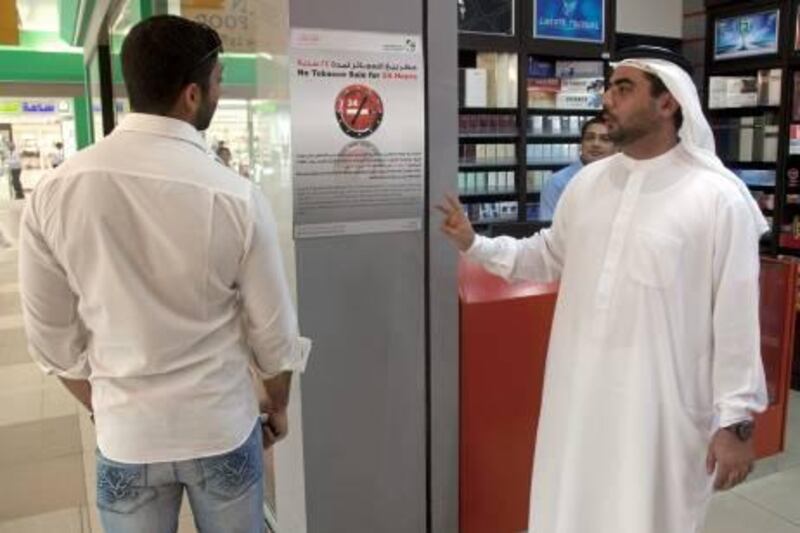DUBAI // If dire health warnings and a temporary ban on cigarette sales were not enough to convince smokers to quit, perhaps displaying diseased organs preserved in formaldehyde would be.
That was the thinking behind Dubai Municipality's efforts to mark World No Tobacco Day. In an event at the municipality's headquarters yesterday, organised in partnership with the pharmaceutical company Johnson & Johnson and Dubai Medical College, the organs of former smokers were displayed as a graphic warning over the effects of the habit.
Those smokers shocked into quitting were then able to take advantage of free Nicorette patches and health examinations on offer at the event.
And if their resolve began to wane on the drive home, it would have been strengthened by a 24-hour ban on cigarette sales at Emarat, Eppco and Enoc petrol stations and 63 other major outlets including Carrefour, Spinneys, Choitrams and Lulu Hypermarket.
Hani al Shboul, a Jordanian who has been smoking for more than 16 years, hoped the event would help him stop. "I want to quit so that I can maintain a healthier lifestyle. Also, I have two very young children, so I have to think of them," Mr Shboul said.
Seeing the diseased organs made smokers think twice, said Fauzia Shahid, a healthcare manager for Johnson & Johnson.
"What you see can scare the living daylights out of smokers. It's a fact that 80 per cent of smokers are at risk of developing lung cancer, which is unfortunately on the rise here," said Ms Shahid.
Dr Fouzia Shersad, the director of Institutional Effectiveness at Dubai Medical College, agreed.
"This campaign will spread the message exponentially once people know what can happen to their body," she said. "Even when you do not feel symptoms, the microscope shows the effects are building up."
She said smokers usually decided to quit only when it was already too late.
Young people and women were taking up the habit in increasing numbers, according to Dr Mohamed Metwalli, the occupational medicine specialist for Dubai Municipality's Public Health Services.
"The number of female smokers increases annually by approximately 20 per cent. Last year, the World Health Organisation's Anti Tobacco Day specifically targeted women," said Dr Metwalli. "We also need stricter rules about selling cigarettes to youths."
He said all ministries and local authorities should work collaboratively to combat smoking. The municipality's 24-hour ban on cigarette sales was supported by 90 per cent of major outlets, according to Redha Hassan Salman, the director of Public Health and Safety at Dubai Municipality.
Enoc decided to extend the initiative beyond the emirate's borders and stopped selling cigarettes at all its stations.
"Sales of course will be affected but it's a clear message of corporate social responsibility to encourage people to refrain from smoking," said Khalid Hadi, the director of Brand and Corporate Communications at Enoc. "We banned the selling of cigarettes at 170 of our stations in Dubai and the Northern Emirates."
At least five million people worldwide die of smoking-related illnesses every year, according to the US Centre for Disease Control, which also predicts that by 2030 the figure will rise to eight million deaths annually.






